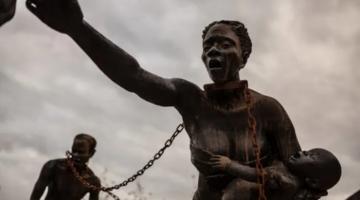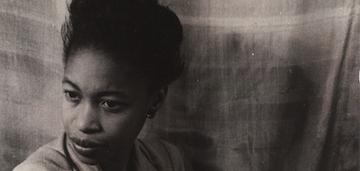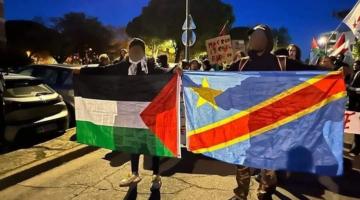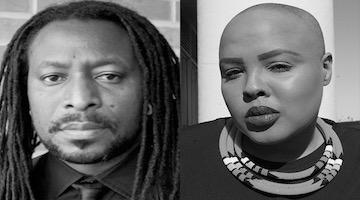In this series, we ask acclaimed authors to answer five questions about their book. This week’s featured author is Emilio Amideo. Amideo is a research fellow in English language and translation at the University of Naples “L’Orientale.” His book is Queer Tidalectics: Linguistic and Sexual Fluidity in Contemporary Black Diasporic Literature.
Roberto Sirvent: How can your book help BAR readers understand the current political and social climate?
Emilio Amideo: One of the aims of my book Queer Tidalectics is to outline an ever-expanding affective archive of the experiential knowledge pertaining to the Black queer diaspora. This archive is “affective” both because it contains emotions and embodied practices of resistance and also because it is meant to affect (meant as a verb) the readers, hence opening up the possibility of a generative interaction with them. Also, it is ever-expanding since I am following in the footsteps of many writers, theorists and activists in black queer studies and practices, and I hope that many more will follow.
The importance of contributing to such an archive is readily available if we consider that nowadays, despite some advancement in race and gender relations in the Western world, the situation for sexual and racial minorities continues to remain critical as the recent rise of White nationalists worldwide demonstrates. This is particularly true for women and queer people belonging to racial minorities since they continue to be among the most economically, socially, and politically disadvantaged groups globally. Their marginalization, which more often than not translates into voicelessness, is also reflected at a textual level in the silencing of the narratives describing the Black queer experience and existence.
It is to make an intervention in this arena that my book turns to the practices and strategies that Black queer writers have employed over time to negotiate their experiential and textual space in the tension with a potentially hostile environment, thus affirming their presence through the creation of an alternative archive that is capable of contrasting erasure.
In this sense, it aligns with the scope of the series “Critical Insurgencies” (edited by Michelle M. Wright and Jodi A. Byrd for Northwestern University Press) since it aims at forging new theoretical and political practices capable of challenging different forms of oppression and state violence and, by creating a conversation between academic writing and popular texts and practices, opening up a space for possible generative future imaginings.
What do you hope activists and community organizers will take away from reading your book?
Well, first of all, I hope that by giving voice to certain marginalized experiences the readers might either recognize themselves in those stories or empathize with them. In both instances, and fundamentally, I hope that the exploration of these texts and stories might be both a source of empowerment and a way of urging people to mobilize in the quest for a much needed cultural and political change when it comes to issues of gender, sexuality and race.
In this sense, my intervention can be read in the wake of M. Jacqui Alexander’s proposition in her seminal work Pedagogies of Crossing where she invites us to intervene in the multiple spaces where knowledge is produced and to explore counter-narratives as pedagogies, that is to say as a way of learning/teaching that can open up on new modalities of existence. To say it with Alexander, in this way we may learn to “move away from living alterity premised in difference to living intersubjectivity premised in relationality and solidarity.”
Another issue that I hope the readers will take away from reading the book is the reflection on language and language use. This is a very tricky matter, and of the utmost importance to me. It goes from being aware of the issue of labelling and the possible constraints of language to its opposite, that is to say, the possibility to bend the language, to alter it by acting upon it, and recompose it so that, to use Marlene NourbeSe Philip’s words, “it begins to serve our purposes”. This is particularly reflected in Black linguistic practices that have always been invested by a strong element of performativity and by the privileging of dynamic rather than fixed narrative forms and ideas; something that has been (and continues to be) a very important instrument of resistance.
We know readers will learn a lot from your book, but what do you hope readers will un-learn? In other words, is there a particular ideology you’re hoping to dismantle?
I can think of many ideologies needing to be un-learned. Racism is one of them, and so is sexism, ageism, ableism, homophobia, classism, and the list goes on. This might be an obvious statement, so I would like to slightly shift the focus toward something that is more subtle and that yet subtends to many, if not all, of these ideologies. Something that more than an ideology can be considered a habit. What I am talking about is our keenness for categorization. Of course, I recognize that categorization is a basic function of our cognitive process, we make sense of our experiences and understand things by classifying elements through categories that are meant as opposites. Yet, while I recognize that this is how our brain necessarily functions, I hope the book will teach the readers to un-learn the habit of too hastily separating elements in dualistic and essentialist terms. As I said, categorization is inevitable, yet we should unlearn to give in to it too quickly, uncritically, since this can soon lead to discriminatory practices whether for gender, race, age, sexuality, class or in terms of ableism.
This is something that Jackie Kay explained very well in a 2002 interview where she said that once you label a writer (but the issue could be stretched to include other instances) you not only mark that person as being “different” (regarding sexuality, gender, or race) from other writers, thus reiterating dominant or subaltern positions, but also produce certain expectations in the reader who approaches their work. Her discussion of how Whiteness and heterosexuality remain uncategorized or unlabeled terms (e.g., we very rarely, if at all, hear the construction “X is a White heterosexual writer”, but we often hear that “Y is a Black gay writer”) should make us think about how our language use – and in this way I return to the point I made before – should always be critical so as to not corroborate a prejudiced approach which is a reflection of the racialized heteropatriarchy we still live in.
Who are the intellectual heroes that inspire your work?
I surely owe a lot to the intellectual tradition of Black feminism (particularly the work of lesbian or queer writers and theorists) and, more generally, to the writings and experiences of “women of colour” as they defined themselves (especially queer Chicana writers such as Gloria Anzaldúa and Cherríe Moraga – I am thinking about the seminal collection This Bridge Called My Back: Writings by Radical Women of Color, 1981). Their intersectional work has opened a world to me since the beginning of my university years (and in some cases even before then) and has most definitely shaped my research and writing ever since.
The reflections on positionality and embodiment, Audre Lorde’s work on the uses of the erotic as power (and the uses of anger, to mention just a very few examples), and especially Gloria Anzaldúa and Cherríe Moraga’s coarticulation of theory and praxis in what they call “theory in the flesh”. I am also indebted to the tradition of the écriture feminine by Helen Cixous (especially, but not only, “Le rire de la Meduse”, 1975) and Luce Irigaray, Catherine Clément and Julia Kristeva, among the others.
The “prophetic” writing of James Baldwin is also a great inspiration for me and so is the poetry of Essex Hemphill and his capacity to address very painful topics with a vulnerability that reflects an incredible strength and a candidness that can be raunchy and sweet at the same time, surely touching.
I owe a lot also to the work of Édouard Glissant, especially his poetics of relation, and more recently to Saidiya Hartman who has magisterially reflected on the possibility offered by the process of critical fabulation as a way of addressing the gaps and the partial rendition of events in the historical archive.
In what way does your book help us imagine new worlds?
In Queer Tidalectics I draw on the concept of fluidity – epitomized by water and by extension the ocean (both the Atlantic and the kala pani) as a symbol of the Black diaspora – to reflect on the contemporary Black queer diasporic experience. Drawing on the back-and-forth movement of the sea waves and its capacity for transformation, the book seeks to propose an affective archive that remains fluid, in constant movement, and open to change and that, as such, avoids settlement in monolithic and reductive discourses crystallized around essentialist conceptions of identity. This, for example, enables us to think about both gender and sexual expression as a spectrum, thus inviting a reflection on how femininity and masculinity move in and across all kinds of bodies. Similarly, the intention is to advance the possibility of relational forms of belonging and affiliation over a solipsistic individuality or an uncritical attachment to sort of nation-state ideologies. In the same way, the attention to an alternative cyclical relationship with time – one made of deferrals and returns – as opposed to the linearity and fixity of Western official (hetero)historiography, is meant to enable the emergence of silenced experiences; a process that can read (at least in a general sense) in communication with Hartman’s idea of critical fabulation.
I think that in short, what I seek to reflect on with the book and through the affective archive that contains is both how language and identity are constantly undone (and reinvented) in the face of the other (to paraphrase Judith Butler), and how continuous revisions are not only desirable but necessary.
Roberto Sirvent is editor of the Black Agenda Report Book Forum.















